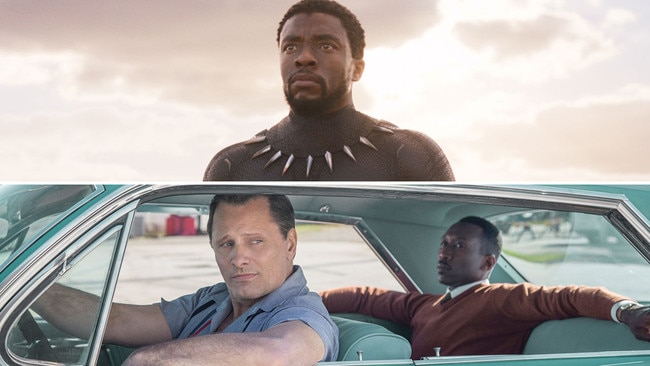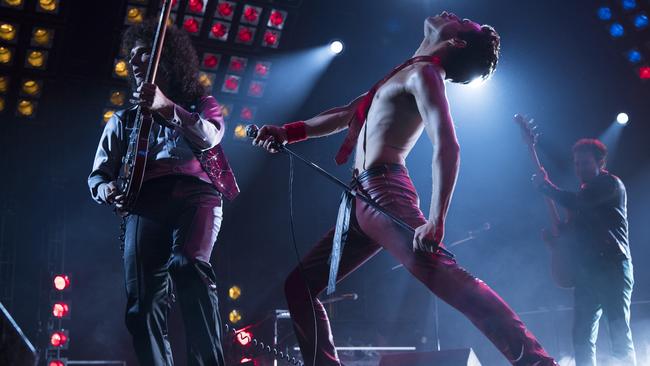In charged political climate, best picture Oscar is about more than the movie
In this charged political climate, supporters of Black Panther and other nominees look past the films to what they represent.

In the 2019 Oscar race for best picture, a vote for a film has become a vote for a cause.
Black Panther fans say the Marvel movie deserves to win because of its cultural impact and the diversity of its cast and creators. Champions of director Spike Lee and his BlacKkKlansman a drama set in the 1970s — and ending with real-life footage from the violent 2017 white nationalist rally in Charlottesville — want to spotlight his commentary on racial hatred.
A vote for Green Book can be seen as supporting interracial harmony, fans of the buddy movie say, while detractors call it one-sided, tone deaf, and clouded by behind-the-scenes controversies. Supporters of Bohemian Rhapsody celebrate its upbeat themes of creative expression and rock and roll. But critics of the Queen biopic say it mishandles the sexuality of its gay lead character and is plagued by accusations of sexual misconduct by its director.
The Oscars have always been subjective, of course, but at its core, the best picture award is meant to recognise greatness on-screen. Now, movements such as #OscarsSoWhite, a call for Hollywood diversity that emerged in 2015, and the rising influence of social media, have changed the conversation about which films deserve to be honoured. As a result, debates about the quality of movies are less divisive than those about the high-voltage issues that the movies represent. With America in a seemingly constant political and cultural uproar, partisan rancour has spilt into the Oscars competition.
“I’ve been doing this for 20 years of my life, and I’ve never seen it reach this level,” says Sasha Stone, founder and editor of the news site AwardsDaily.com. In a January essay, Ms Stone defended Green Book, about a black musician and his white chauffeur on tour in 1962. It was an example of the opprobrium that hits filmmakers who fail to meet certain standards of inclusivity or conscientious storytelling, she says.
Just before Green Book was released in November, actor Viggo Mortensen, who plays white driver Tony “Lip” Vallelonga, used the n-word on a panel while discussing racism. A brother of the late musician Don Shirley, played by Mahershala Ali, condemned the film as “a symphony of lies.” Shortly after Green Book won many Golden Globe awards, years-old feature stories about director Peter Farrelly resurfaced, describing how he used to expose his penis on set as a prank. Not long after, co-writer and producer Nick Vallelonga, son of the man Mr Mortensen plays in the film, drew fire for an Islamophobic tweet that he had posted in 2015. These flare-ups elicited apologies from the people implicated. As Green Book racked up awards, the filmmakers emphasised its conciliatory themes, summed up in its tagline: “Inspired by a true friendship.”
“Discussing aspects of movies that offend people, that’s a valid conversation,” Ms Stone says. “What is weird is the intended destruction (via social media) of the people who made the film, and the film itself as an evil that must be purged. And if you support the movie in any way you get swept up in it. It’s almost as if nothing else matters except for these political points.”
Others say awards season simply amplifies the long-overdue reckoning that Hollywood faces over its checkered history of stereotyping based on gender, class, sexuality and race.
“There’s a pattern of flattening black characters, or using them only to help a white protagonist grow,” says Brooke Obie, managing editor for Shadow and Act, a news site about black talent in entertainment. She took aim at that formula in a critique of Green Book, and also called out the movie’s handling of the book referenced in its title, a series of guides that helped black drivers navigate segregated businesses on potentially dangerous roadways. Ms Obie’s review led to a story about the Shirley family’s anger over the film, which went viral.
There’s more at stake in such coverage, she says, than one movie or its growing haul of awards. “It’s the type of film Hollywood likes to make, in which situations are contrived so a white character saves the day,” she says. “Seeing ‘white saviour’ narratives over, and over, and over, creates a racial hierarchy in the mind of viewers.”

Smear campaigns have long been used in Hollywood to undermine awards contenders and sway voters. Social media has intensified the speed and scope of the take-downs.
A digital brouhaha in January illustrates the stakes and strong feelings. On the night of the Golden Globes, 15-year-old Elsie Fisher, nominated for her starring role in the coming-of-age film Eighth Grade, posted a message on Twitter celebrating wins by Bohemian Rhapsody and its lead actor, Rami Malek, who played singer Freddie Mercury.
Some people pounced on the tweet, slamming the praise of Bohemian Rhapsody because the movie was directed by Bryan Singer. Mr Singer, who was fired during production, has denied allegations that he sexually assaulted teenage boys. Other respondents came to Ms Fisher’s defence, arguing that she was entitled to be a fan of the movie and Mr. Malek’s performance.
Less than 10 minutes after her first jubilant tweet, Ms Fisher tweeted, “Why is everyone being so mean about this? I’m genuinely sorry if I did something wrong :(” That was followed by a conciliatory tweet, in which Ms Fisher said she’d been brought up to speed on the controversy about Mr Singer.
One Oscar voter, a woman who was invited to join the Academy last year amid the organisation’s efforts to expand and diversify its membership, says Academy members discuss the public disagreements over nominees. But that probably has less influence on voters than the individuals’ roles in the industry and their relationships, she says, adding, “I would hope people are voting on the merit of the film as opposed to the background stuff going on behind the scenes of each and every one.”
In a rancorous year for movies, a lack of controversy might harm a nominee’s chances for best picture. Vice, for example, is a tone-shifting biopic about Dick Cheney that once seemed destined to rile liberal and conservative viewers alike. Yet the best picture nominee has prompted not controversy but consensus — on Christian Bale’s striking transformation into the former vice president.
Some nominees carry additional symbolism unrelated to what is onscreen. Roma, a black-and-white portrait of family, class and ethnicity in 1970s Mexico, is a front runner for best picture — and also a Netflix movie. More viewers probably saw Roma on their computers or TVs and not in theatres, where Roma received a narrow release. A win for Roma would represent a milestone in the streaming company’s incursion into the industry.
Ads aimed at Oscar voters describe the film as “a monument to the power of film” — a characterisation Netflix’s rivals might find ironic. The way in which Roma was released, with Netflix withholding the customary box-office results and major theatre chains refusing to show the film, demonstrates how the streaming service is up-ending the entertainment business. But such politics may not be a problem for Roma, given the growing number of people in Hollywood now working with Netflix.
The Wall Street Journal


